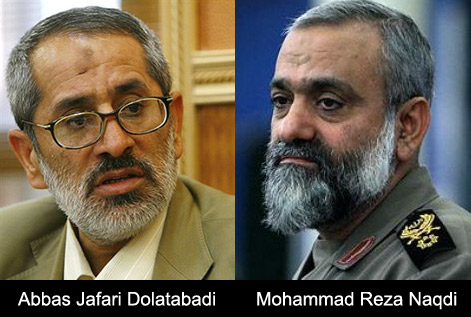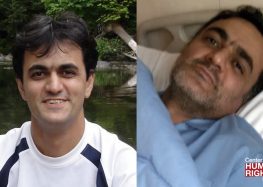EU Should Blacklist Human Rights Violators
US adds Tehran Prosecutor and Basij Militia Commander to Blacklist of Human Rights Offenders
 (24 February 2011) The International Campaign for Human Rights in Iran welcomed the addition of two Iranian officials by the United States government today to its list of human rights offenders, as well as reports that six European Union (EU) member states have called for targeted sanctions against Iranian officials who have committed grave human rights abuses.
(24 February 2011) The International Campaign for Human Rights in Iran welcomed the addition of two Iranian officials by the United States government today to its list of human rights offenders, as well as reports that six European Union (EU) member states have called for targeted sanctions against Iranian officials who have committed grave human rights abuses.
The Campaign reiterated its call for governments around the world to blacklist such officials. Britain, France, Germany, Greece, the Czech Republic and the Netherlands reportedly favor EU-wide sanctions.
The Campaign is urging, in particular, the governments of Canada, Malaysia, the United Arab Emirates, and Thailand, in which known Iranian human rights offenders are most likely to hold assets or travel, to also institute asset freezes and travel bans against them.
“As citizens in Iran and throughout the Middle East protest for their rights, EU-wide sanctions against perpetrators will show the Iranian people that Europe understands their plight and is trying to change it for the better,” said Hadi Ghaemi, spokesperson for the Campaign.
“The continuing and worsening human rights crisis in Iran obligates members of the international community to take actions that have concrete impact, and that demonstrate moral condemnation,” he said.
On 29 September 2010, the United States government blacklisted eight Iranian officials under the terms of Executive Order 13553, which freezes assets located in the United States of those designated, and subjects them to visa bans.
On 23 February 2011, the US government designated two additional officials, Abbas Jafari Dolatabadi, the Tehran Prosecutor General, and Mohammad Reza Naqdi, Commander of the Revolutionary Guard’s Basij militia forces.
Dolatabadi has played a central role in systematic abuse of judicial powers to unfairly prosecute activists and protestors and sentence them to draconian prison terms and execution sentences.
“Every single indictment against dissidents in Tehran bears Dolatabadi’s signature. His role in trampling the rights of detainees is indisputable,” Ghaemi said.
Dolatabadi is also among the top Iranian officials responsible for an execution binge in which over 110 persons have been put to death since the beginning of 2011.
“The 1500 persons arbitrarily detained for peaceful protests on 14 and 20 February are at risk of facing trumped-up charges,” Ghaemi added.
Among those facing execution as a result of Dolatabadi’s prosecution is Canadian-Iranian web developer Saeed Malekpour, who was convicted for operating a “pornographic” website and “insulting the sanctity of Islam.”
The Campaign welcomed the designation by US authorities of Mohammed Reza Naqdi, which it had recommended on 30 September 2010. Basij militia under Naqdi’s command have been at the forefront of violence and repression against civilians attempting to exercise their human rights since the tainted 2009 presidential election, including on 14 and 20 February 2011, when, under Naqdi’s orders, they beat peaceful demonstrators with electric batons, chains, and clubs.
Under Naqdi’s command, the Basij leadership has ruthlessly exploited thousands of poor and vulnerable Iranian teenagers, extending material inducements and promises to lure them into a militia unit that routinely intimidates and terrorizes the population.
“The Basij are both victimizers and victims. Child soldiers bear the heavy burden of carrying out misguided and criminal policies,” Ghaemi said.
“Targeting Iranian officials implicated in gross human rights violations is a powerful way for the international community to respond to the unfolding human rights crisis in that country,” he added.






